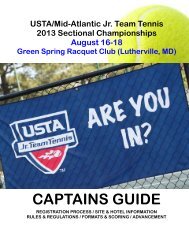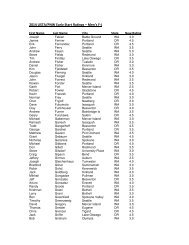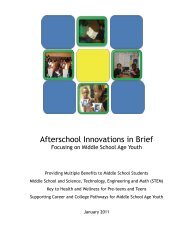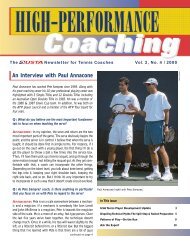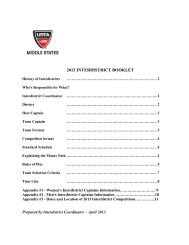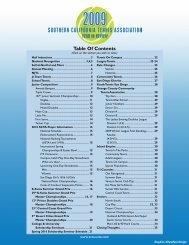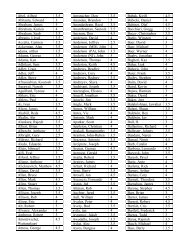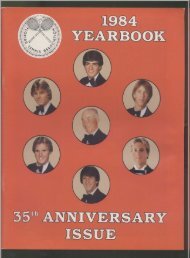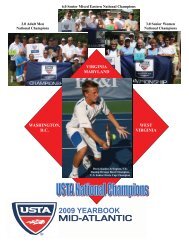FRIEND AT COURT 2010 - USTA.com
FRIEND AT COURT 2010 - USTA.com
FRIEND AT COURT 2010 - USTA.com
Create successful ePaper yourself
Turn your PDF publications into a flip-book with our unique Google optimized e-Paper software.
event is $250. Thus, if an amateur participates in both the singles and<br />
doubles events in a particular tournament, the amateur could accept a<br />
prize having a maximum value of $250 for participation in the singles<br />
event and another prize having a maximum value of $250 for participation<br />
in the doubles event.<br />
2. Allowable prizes. A prize may include, but is not necessarily limited to, the<br />
following:<br />
• Trophy or medal;<br />
• Merchandise (for example, apparel, suitcases, rackets, silverware);<br />
• Gift certificate;<br />
• Membership or playing privileges at a tennis club with the amateur<br />
having the right to designate the club;<br />
• Tennis lessons with the amateur having the right to designate the<br />
professional or organization providing the lessons;<br />
• Scholarship with the amateur having the right to designate the<br />
school; and<br />
• Tax deductible contribution by the Tournament Committee with the<br />
amateur having the right to designate the recipient of the<br />
contribution.<br />
3. Cash prizes may not be given to amateurs. A prize cannot be cash or any<br />
award which may be surrendered for cash.<br />
4. Donation of prize money to school or tennis organization by<br />
Tournament Committee. If a player cannot accept prize money or a prize<br />
because the player is an amateur, then the Tournament Committee or<br />
sponsor has the discretion to give the prize money or prize to:<br />
• A high school or college;<br />
• The athletic department of a high school or college, which may be<br />
for a specific use such as the tennis team;<br />
• A Sectional Association; or<br />
• A tennis patrons organization that is approved by its Sectional<br />
Association for receipt of the prize money or prize, provided that the<br />
player does not determine the recipient.<br />
I. Enforcement Procedure over Amateur Status<br />
1. Role of <strong>USTA</strong> President and <strong>USTA</strong> Grievance Committee in payment<br />
of amateur expenses. The President and the <strong>USTA</strong> Grievance<br />
Committee, acting jointly, may exercise supervision and control over<br />
the payment and acceptance of expenses as may in their judgments be<br />
necessary to insure an observance of these regulations. The President<br />
and the Chairperson of the Grievance Committee, acting jointly, are<br />
authorized to engage and pay for investigative services as they deem<br />
necessary and proper to insure the proper enforcement of these<br />
regulations.<br />
2. Sectional Association jurisdiction over amateur status. A Sectional<br />
Association may elect to exercise jurisdiction over its amateurs and<br />
require that they obtain special permission from it before accepting<br />
expenses in connection with their participation in a tournament, match, or<br />
exhibition. Election by a Sectional Association to exercise this jurisdiction<br />
will be<strong>com</strong>e effective only upon receipt of formal notice by the Secretary<br />
of the <strong>USTA</strong>.<br />
224 <strong>USTA</strong> REGUL<strong>AT</strong>IONS XVIII.I. (Enforcement Procedure over Amateur…)



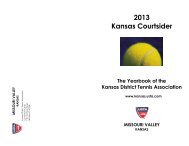
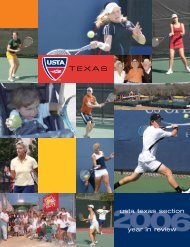
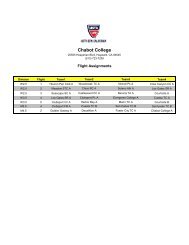

![COMPLETE - 2013 Tournament Schedule [11_20_12] - USTA.com](https://img.yumpu.com/21906454/1/190x245/complete-2013-tournament-schedule-11-20-12-ustacom.jpg?quality=85)

